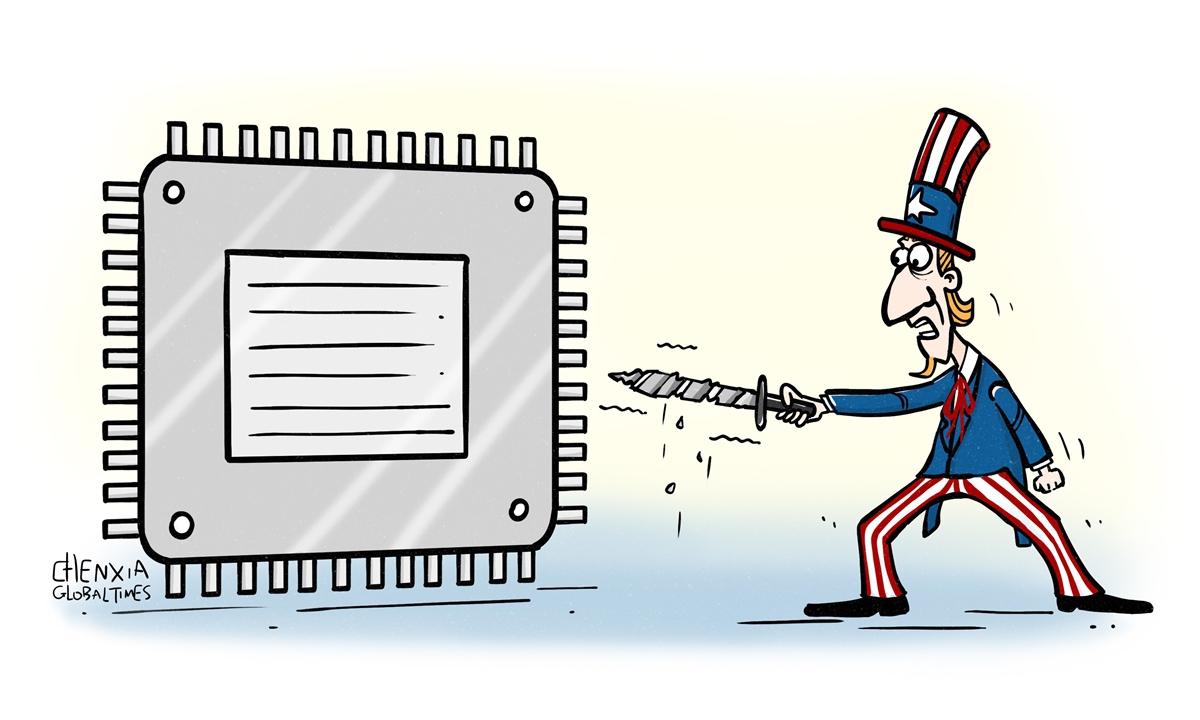
Illustration: Chen Xia/GT
Shanghai-based Advanced Micro-Fabrication Equipment Inc. China (AMEC) announced that it has recently filed a federal lawsuit against the US Defense Department over its designation as a "Chinese Military Company." Another Chinese tech firm, Hesai Technology, reportedly succeeded in "forcing" the Pentagon to remove it from the blacklist through a lawsuit. Some Western media outlets have interpreted this as an "embarrassing reversal" for the Pentagon, with some even questioning why it's so difficult for the Department of Defense to prove that Chinese companies are "military-related."
This feigned astonishment is laughable. Why would the Pentagon, with the world's strongest military, find it so challenging to label Chinese companies? The answer is simple: They lack strong evidence. And, that's all. However, such a simple truth has led to American public opinion being "confused" as to why many Chinese companies on the blacklist can repeatedly sue US government agencies, including the Department of Defense, and win. They are actually telling the world that the US has many charges preset and must impose them on Chinese companies.
Before these two companies, others like Xiaomi and Luokung successfully had the Pentagon remove them from the blacklist through lawsuits. This demonstrates that the list is, in fact, a "political list" lacking evidence and maliciously targeting Chinese companies. In recent years, influenced by the mind-set of overstretching the concept of national security, the US administration has launched numerous unjust investigations against Chinese firms, fully aware of their unfairness. Some have added a "democratic filter" to the Pentagon's failure, framing it as the "administrative cost of upholding democracy and the rule of law." This attempt to save face does not change the fact that proving something baseless is inherently difficult.
More importantly, due to China's pivotal position in the industrial chain, it is often not easy to find alternatives that are more suitable than Chinese products. This is the deeper reason why the US has always found it difficult to completely ban Chinese products. Taking chips as an example, the US government has tried every means to kick China out of the chip industry chain, but the actual result is that American companies like NVIDIA have found ways to enhance business with China. In the second quarter, sales to China by Dutch company ASML surged 21 percent, leading to a record high in Dutch exports to China. This is a tangible manifestation of the complementary relationship between the two sides. Despite the numerous sanctions imposed on Chinese companies in recent years by different US authorities including the US Department of Defense, the actual effects they have achieved are often quite limited, and sometimes even counterproductive. This is fundamentally because the complementarity of the US-China economic and trade relations is playing a powerful role.
What needs to be emphasized is that the success of some Chinese companies in "fighting back" does not necessarily indicate that the US Department of Justice is being fair to them. In fact, this is just a case of the US Department of Defense being unable to produce evidence and retreating in the face of difficulties. It is well known that the "counterattacks" of Chinese companies often occur under the pressure of "cross-border attacks" from Washington's executive, legislative, and judicial branches. Their success is particularly difficult to achieve, further proving that the release of the internal driving force of economic and trade exchanges between the two countries is unstoppable. The more discriminatory practices the US employs against Chinese companies, the more difficult it will be to advance. This is the highly probable result.
We hope that Washington can view these lawsuits with a true spirit of rule of law and a healthy mind-set. Simply looking for so-called reasons that make it difficult to hold Chinese companies accountable will only prove that the starting point of the US policy is wrong. Facing and adapting to the reality of interdependence in the China-US economic and trade relationship, rather than attempting to sever this natural connection, is beneficial for both China and the US, as well as for the prosperity and stability of the world. If one truly wants to avoid the kind of "embarrassment" experienced by the US Department of Defense, the most dignified approach is to openly accept the complementary and mutual beneficial aspects of the economic and trade relationship between the two countries, increase cooperation and mutual benefit, and reduce the push for "decoupling."


